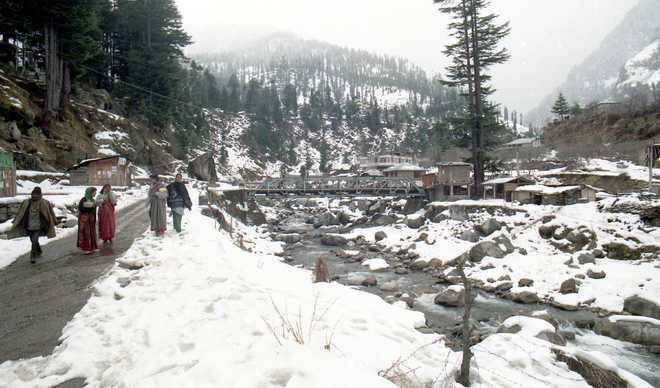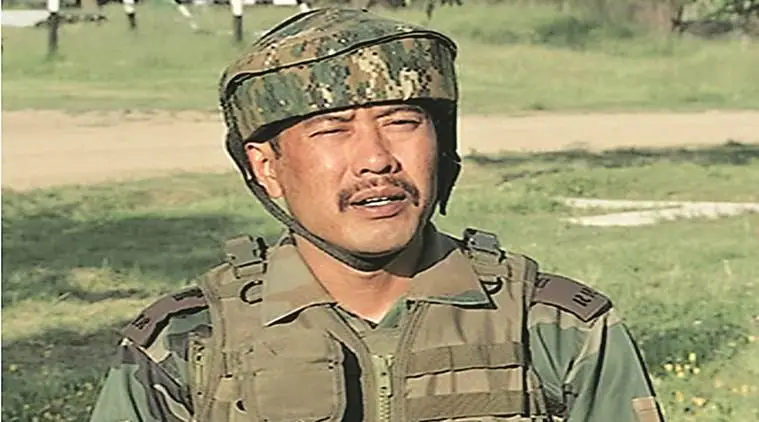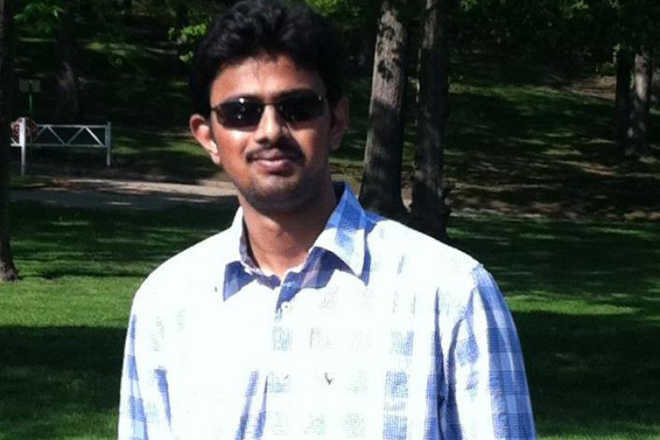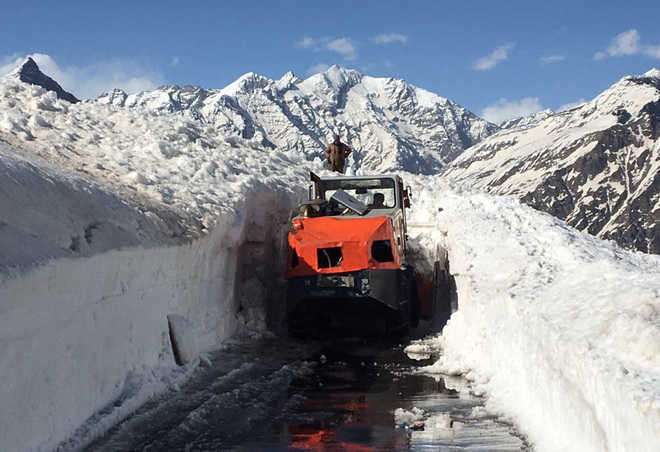











Our Correspondent
Chamba, April 30
The administration of Pangi subdivision in Chamba district has started clearing snow from the Saach Pass on a war footing and is trying to link the valley with the rest of Chamba district by the first week of May.It is for the first time that the highway will be opened to the vehicular traffic in a record time, if the weather conditions remain favourable. Resident Commissioner Rohit Rathore said on Sunday that the PWD had pressed into service JCB machines and dozers to clear the snow from the pass.“The highway connects Pangi valley headquarters Killar with Chamba district,” Rathore said.For providing easy telecommunication connectivity to residents of the valley, Rathore said private telecom operators were also being contacted to install more mobile towers. The Killar-Chamba highway is the lifeline for the people of Pangi.

A day after police questioned a young woman after a fracas at a Srinagar hotel where she had shown up with two men including Major Leetul Gogoi, the officer who tied a civilian to a jeep and drove through several villages of Budgam last year, her mother claimed Gogoi had “raided” their house at night twice in the past and, on both occasions, was accompanied by Sameer Ahmed, the man who was with them at the hotel. Police sources said Sameer Ahmed too was in the Army.
On Wednesday, Gogoi, Ahmed and the woman were questioned at a police station following an altercation at the Hotel Grand Mamta after the staff refused to let her in. Police said the officer was later handed over to his unit. SP North City Sajad Ahmad Shah, who was asked by IGP (Kashmir) S P Pani to conduct an inquiry, said police were told that a room in the hotel had been booked in the name of Leetul Gogoi.
On Thursday, at the home of the young woman in a village in Budgam, her mother said: “She left home in the morning saying she would go to the bank and return soon. We had gone to work in the fields. We had no idea about it (the Srinagar incident) till others in the village informed us late in the afternoon.”
She claimed that Gogoi came to their house at night twice in the past. “He raided our house twice. On one occasion, I fainted when I saw the Army. On both occasions, he (Gogoi) was accompanied by Sameer. He warned us not to tell anyone about the raid,” she claimed.
Her daughter, the woman said, was associated with a Self Help Group. On Wednesday, she told them “she had to go to the bank to deposit some money. I gave her Rs 500. She picked her bag and left. She also took along her documents”.
The woman said her daughter was 17 years old. But police said she was an adult. She was allowed to leave after recording her statement. Sources said her school and Aadhaar records show her year of birth as 1998. Following the incident, she headed to a distant village to stay with a relative.
The BSF had lost two of its jawans in the latest round of unprovoked firing on the Jammu IB. AFP file
Jammu, May 20
The Border Security Force (BSF) has said that the Pakistan Rangers on Sunday “pleaded” with them to stop firing along the IB after being pounded with heavy artillery that also left a trooper dead across the border.
ANI✔@ANI
#WATCH: BSF troops on the western borders, bust a bunker across international boundary on May 19. #JammuAndKashmir (Source: BSF)
The border guarding force also released a 19-second thermal-imagery footage showing the destruction of a Pakistani picket across the border in retaliation to the unprovoked firing and shelling along the IB. “(Pakistan) Rangers called up Jammu BSF formation today and beseeched to stop firing,” a BSF spokesman said.
“The befitting reply by BSF units to the unprovoked shelling and firing across the IB by Pakistani forces has forced them to plead for ceasefire,” a senior official said.
“For the last three days, the precision fire of BSF troopers on Pakistani firing locations inflicted heavy losses and on Saturday this firing found their mark with one of the rangers in chicken neck area,” the official said.
The BSF had lost two of its jawans in this latest round of unprovoked firing on the Jammu IB over the last few days.
A number of civilians were also killed and injured in the Jammu area due to this firing incident which was seen to have increased in the wake of Prime Minister Narendra Modi’s day-long visit to Jammu and Kashmir on Saturday.
Jammu and Kashmir witnessed a spurt in Pakistani shelling and firing along the IB and the Line of Control (LoC) this year.
Over 700 incidents of fire and shelling were reported, which left 38 people including 18 security personnel dead and scores injured. PTI
Terror is terror, and there can be no differentiation between a Masood Azhar, Hafiz Saeed or Umar Khorasani. Till Pakistan accepts this fundamental truth, global terrorism will keep raising its head

Pakistan is a land where proverbial home-grown chickens come home to roost. From its genealogically flawed ‘two-nation’ theory to its deliberate attempts to ‘Shariaze’ itself during the 1980’s regime of dictator General Zia-ul-Haq — the consequences of its surrender towards puritanical religiosity has been a saga of steady regression.
According to a US report 10 years back, ‘World at Risk, 2008’, all global roads leading to weapons of mass destructions, proliferation and terrorism were said to pass through Pakistan. This was even accepted in the corridors of power in 2009, when the then head of Pakistan’s infamous Inter-Services Intelligence (ISI), Lt Gen Shujaa Pasha, had unprecedentedly declared, “Terror is our enemy, not India”.
Today, the Pakistani establishment cries wolf about the “cost” that it has incurred for the “war on terror”, when it rattles of figures like over 74,000 casualties in 14 years and an economic cost of $123 billion! True as the figures may be, the patented Pakistani duplicitousness on handling terror, had led to US President Donald Trump’s irate and frustrating tweet, “The United States has foolishly given Pakistan more than 33 billion dollars in aid over the last 15 years,” and added that in return, “they have given us nothing but lies & deceit”.
Closer home, double-standards of Pakistan on terrorism has already riled its neighbours ie, India, Afghanistan and even Iran. While India was well-versed with Pakistani insincerities since independence, with Islamabad’s fingerprints across various insurgencies in India. Afghanistan woke-up to the poison unleashed and nurtured by the likes of Pakistani politicians like Naseerullah Babar and radicalised military men like Lt Gen Hamid Gul (known as the ‘father of the Taliban’; ‘butcher of the Afghans’ among others) — making the continuous Pakistani support and abetment to terror groups, the single biggest factor deterring peace in Afghanistan.
The misguided Pakistani attempt to continuously use terror groups as levers of influence for ‘strategic depth’ within Afghanistan, led Afghanistan President Ashraf Ghani to quote, “As a Taliban figure said recently, if they had no sanctuary in Pakistan, they wouldn’t last a month”.
Even the Iranian Chief of the Armed Forces, Major General Mohammad Baqeri had vented his angst against Pakistani machinations by saying, “We expect the Pakistani officials to control the borders, arrest the terrorists and shut down their bases” and then added for good measure, “If the terrorist attacks continue, we will hit with crushing blows to their safe havens and cells, wherever they are”.
Meanwhile, India dealt with backhand Pakistani chicanery at the high-tables of the United Nations Security Council (UNSC), where repeated attempts to declare Masood Azhar (terrorist leader behind Mumbai 26/11, Pathankot 2016 and other terror attacks) of the Jaish-e-Mohammed group, a
‘global terrorist’, was repeatedly disallowed in connivance with Pakistan’s ‘all-weather friend’ China, vetoing the proposal. This despite the fact that his group Jaish-e-Mohammed was earlier blacklisted as a terrorist group in 2001 for “participating in the financing, planning, facilitating, preparing or perpetrating of acts or activities by, in conjunction with, under the name of, on behalf or in support of” of Al Qaeda and Osama bin Laden, besides his India-centricity on terror.
However, owing to electoral technicalities of ‘veto’ and the implausible logic of ‘non-state’ actors, Pakistan got away without Masood Azhar’s individual listing. Further, with a $10 million US bounty on the head of another India-facing and UNSC declared terrorist, Hafiz Saeed — the brazen free run afforded to him in Pakistan — cocks a snook at any portents of Pakistan’s supposed sincerity on ‘war on terror’.
Recently, in an eerie reversal of fate, Pakistani efforts to blacklist the Pakistan-facing terror group, Jamaat-ul-Ahrar (JuA) leader, Umar Khurasani, as a UNSC-designated terrorist met with parallel ‘technical’ disallowance by the US. Like in the case of both Masood Azar or Hafiz Saeed for India, Umar Khurasani is believed to have made over 150 attacks on Pakistani interests and lives with impunity. The failure to designate him a UNSC listed terrorist led to very familiar woes by the Pakistani Foreign Office, “This action demonstrates the double standards prevailing in the international fight against terrorism and also shows complete disregard of the sacrifices rendered by Pakistan in this fight”.
Like the point made earlier by the Indians on the fact that Masood Azar should get listed as a UNSC designated terrorist, since his organisation (Jaish-e-Mohammed) was already blacklisted — was exactly and incredously invoked by the hapless Pakistanis in their own case, “If the organisation has been listed by the sanctions committee, its leader should also have been listed”.
In this specific case, the technicality of Umar Khurasani ‘operating in Afghanistan’ was supposedly stated by the Americans, akin to the equally untenable line of ‘non-state-actors’ that is routinely made by Pakistan, whenever it is pushed to a corner on its complicity on terror. Indians were still licking their wounds on the unfairness of the circumstances leading to its inability to have an open-and-shut case like that of Masood Azar ratified, when this seemingly parallel narrative elicited a hauntingly similar concern by the Pakistanis on the sanctity of multilateral platforms like the UNSC, “Instead of supporting Pakistani request for listing a terrorist, the US raised an objection. The US needs to act fairly to root out terrorism. Such actions by the US undermine the credibility of the UN sanctions list”!
Pakistan has paid with blood for its intransigence, incorrigible duplicity and half-sincerity on the ‘war on terror’, and today the highly inflammable tinderbox of Pakistan is imploding with its own contradictions and patronages.
The recent admission of irrefutable-complicity on terror by former Prime Minister Nawaz Sharif, only reconfirms what is already known on Islamabad’s patented double-standards.
Terror is terror, and there can be no differentiation between a Masood Azar, Hafiz Saeed or an Umar Khurasani — till Pakistan accepts this fundamental truth, global terrorism will keep raising its head, and more frequently, the Pakistanis will get a dose of their own medicine.
(The writer, a military veteran, is a former Lt Governor of Andaman & Nicobar Islands, and Puducherry)
In public life leaders often end up making statements that are not true to fact. These could be because of their mind playing tricks in the heat of the moment, or perhaps even mischievous advisers. They could be dismissed as bona fide errors. Then there are claims and declarations that are not true to fact, yet are peddled occasionally by leaders, knowingly, because it suits a certain narrative. Often these are pardoned as “untruths”; a concession may be made in view of political, or electoral, compulsions. But a disturbing question arises what to call indiscretions that involve telling wrongs facts, repeatedly, and come from those in high offices. Prime Minister Narendra Modi’s suggestion at a public rally in Karnataka that Congress leaders never met Bhagat Singh in prison is contrary to what is recorded about Nehru visiting the national hero in Lahore jail. During the same campaign, Modi was also heard making statements regarding Field Marshall Cariappa and General Thimayya that were countered by some veteran soldiers. In his latest foray, Tripura CM Biplab Deb has, wrongly, declared that “Rabindranath Tagore returned his Nobel Prize in protest against the British”. While the BJP chief minister may be dismissed by some as a Johnny-come-lately, it cannot be ignored that the government at the Centre, too, has laid out many figures on the economy (GDP, demonetisation, employment) that came from use of statistics that did not necessarily present a picture in the language that people understood. All of these can be called taking liberties with facts. “Rs 15 lakh in accounts”, of course, was dismissed as an electoral jumla.The irony, however, is that Narendera Modi rose from the office of chief minister to prime minister on the back of a huge trust quotient, which was magnified especially in contrast to the corruption-marred UPA-II. In public life, it is hard to retain trust. Every statement — not fully backed with facts no matter under what compulsion — eats into the cache. Modi may have gained a few points by electoral rhetoric, but loses plenty. Hope he has done the maths.
Jammu, May 11
A 22-year-old man was killed on Friday after Pakistani troops resorted to firing from small arms on Indian Army posts along the Line of Control (LoC) in Jammu and Kashmir’s Poonch district, a police officer said.There was small arms firing by Pakistani troops along the LoC in the district’s Gulpur-Bagyal Dhara belt, the police officer told PTI. The Pakistan Army initiated firing around 12.30 am on Indian Army posts in Baghal Dhara, he said.The Indian Army retaliated effectively, the officer said.The deceased was identified as Mohammad Ikhlaq, a resident of Kalsan Malti Baghal Dhara. He suffered serious injuries and died on the spot, the officer said.The man was killed during a marriage function in an area close to the LoC. A bullet fired by from across the border hit Ikhlaq, he said.There has been a spurt in ceasefire violations along the LoC and the International Border (IB) in Jammu and Kashmir this year, resulting in the death of 31 people, including 16 security personnel, in over 700 such incidents. PTI

Washington, May 5
A US Navy veteran was sentenced to life imprisonment for killing Indian engineer Srinivas Kuchibhotla in a racially motivated hate crime at a bar in Kansas City last year.A federal judge in Kansas sentenced Adam Purinton to nearly 78 years in prison as part of a plea agreement reached in March. Purinton would not be eligible for parole until after he turns 100, KSHB reported.In March this year, Purinton, 52, had pleaded guilty to the charges of murdering Kuchibhotla.Purinton was charged with first-degree murder of Kuchibhotla, 32, and two counts of attempted first-degree murder in the shootings of his friend, Alok Madasani, and a bystander, who chased Purinton after he fled the Austin’s Bar and Grill in Olathe city on February 22 last year.In addition to the state charges, Purinton faces prosecution in federal court. The US Attorney’s Office in Kansas filed hate crime charges against Purinton last June.Purinton, yelled, “Get out of my country,” before shooting Kuchibhotla, who later died from injuries sustained in the attack.Kuchibhotla is survived by his wife Sunayana Dumala, who welcomed the court’s decision.“Today’s sentencing in the murder of my husband will not bring back my Srinu, but it sends a strong message that hate is never acceptable,” Dumala said in a statement.“I want to thank the District Attorney’s office and the Olathe police for their efforts to bring this man to justice,” she said.Kuchibhotla hailed from Hyderabad. He had a master’s degree in electrical and electronics engineering from the University of Texas at El Paso. He earned his bachelor’s degree from the Jawaharlal Nehru Technological University in Hyderabad. PTI

Dipender Manta
Tribune News Service
Mandi, April 30
The Border Roads Organisation is struggling hard to restore the traffic movement on the Manali-Leh highway via the Baralacha Pass.The BRO, entrusted with the task to clear the highway of snow, intends to complete the work in two weeks. The highway was blocked in November due to heavy snowfall.The restoration of this road will open the door for the people of tribal district of Lahaul-Spiti to run tourism activities in the region for self-employment.After connecting the 13,050 feet high Rohtang Pass, now the BRO has engaged its workforce and machinery towards the Baralacha Pass.BRO personnel are facing difficulty in moving ahead towards Baralacha due to high accumulation of snow.Talking to The Tribune, BRO Commander Colonel AK Awasthi said, “Due to high altitude, the accumulation of snow is above 20 feet approximately, where we are facing challenge to move ahead. We are making efforts to restore this route within two weeks, provided the weather remains favourable.”Baralacha is a high mountain pass (16,040 feet) in the Zanskar range, connecting Lahaul district in Himachal Pradesh to Ladakh in Jammu and Kashmir and is situated on the Leh-Manali highway.“This year the BRO had restored the Rohtang Pass much earlier and now we are confident that we will be able to restore it by mid-May.”The General Reserve Engineer Force (GREF), commonly known as the BRO, is responsible for maintenance of the 474-km-long Manali-Leh highway. The road is the lifeline for the people of Lahaul-Spiti and Ladakh. It has gained immense strategic importance in view of the ongoing militancy in Srinagar. The Srinagar-Leh highway being very sensitive, the Army has started spending a huge amount on the maintenance of the Manali-Leh highway which had proved its importance during the Kargil war in 1999.People of Lahaul-Spiti, who were engaged in tourism, are waiting desperately for the opening of this route, which will provide them livelihood in the region.
Ifeel much better prepared to be deployed as UN Peacekeeper to a peacekeeping mission, more accountable for preventing conflict-related sexual violence and responding to women’s socio-economic concerns in and post conflict,” said a graduate of a recently-concluded Female Military Officer’s Course, organised by UN Women and the Center for UN Peacekeeping, India. Recruitment, deployment and focused training of female officers is imperative to overcome existing barriers and for gender parity in UN peacekeeping. Women’s participation in UN peacekeeping is more likely to improve civilian protection, especially the prevention of sexual violence against women and girls. But UN Peacekeeping, whose mandate is civilian protection through military, police and civilian contingents from troop contributing countries, remains a male preserve. As of March 31, 2018, women constituted 5% of the 91,058-strong combined forces of military and police peacekeepers, making up 4% of the military and 11% of the police units.

This is despite women’s demonstrated contribution to peacekeeping worldwide. In January 2007, for the first time in UN history, the Indian first all-women UN peacekeeping police unit was deployed to Liberia, with subsequent deployments in 2008 and 2009. They provided security at local events, engaged in riot control and patrols with local and UN police. They communicated with local women, nurturing trust between the police and local communities through community outreach. While this was hailed by the then UN secretary general Ban Ki Moon and Liberian president Ellen Johnson Sirleaf as precedent setting in peacekeeping missions, similar contributions of women peacekeepers from other countries have been recorded in West, East, North and South Africa, South America, and South and Central Asia.
From a rights standpoint, United Nations Security Council Resolution 2242 calls for doubling women’s participation in UN missions. While the landmark UN Security Council Resolution 1,325 emphasises integrating a gender perspective in all peace efforts, a global initiative was launched in 2009 to increase numbers of women police in UN peacekeeping. As one of the largest troop contributors, India can further lead in bridging the gender gap in UN Peacekeeping and preventing crimes against women and girls in international conflicts. A starter could be adopting a national gender sensitive force generation policy on UN peacekeeping, and examining barriers to recruitment and advancement of female officers, which perpetuate inequality in this sphere.



























































